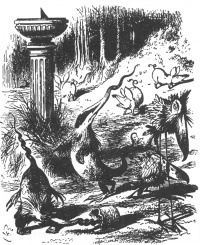Difference between revisions of "Chapter 6"
| Line 4: | Line 4: | ||
After further publicity in Slashdot, Wikipedia attracts increasing attention from the motley bunch of anarchists, radicals and extremists who believe that all knowledge should be free, and who have an obsessive hatred of elitism and of ‘high culture’. | After further publicity in Slashdot, Wikipedia attracts increasing attention from the motley bunch of anarchists, radicals and extremists who believe that all knowledge should be free, and who have an obsessive hatred of elitism and of ‘high culture’. | ||
| − | The ideals of the cyberculture had deep roots, as Fred Turner has persuasively shown, in the counterculture of the 1960s. The ‘counterculture’ was exactly that: a principled opposition to all established culture, especially ''Western'' culture, which was seen as embodying the values of a European educated elite. Earlier forms of socialism had seen high culture as something elevated and precious. Socialist regimes had subsidised art, literature, ballet, | + | The ideals of the cyberculture had deep roots, as Fred Turner has persuasively shown, in the counterculture of the 1960s. The ‘counterculture’ was exactly that: a principled opposition to all established culture, especially ''Western'' culture, which was seen as embodying the values of a European educated elite. Earlier forms of socialism had seen high culture as something elevated and precious. Socialist regimes had subsidised art, literature, ballet, forms developed by an educated elite over centuries. |
The radical thinkers of the counterculture reject ‘high culture’ as an essentially Romantic tradition, celebrating and perpetuating the myth of the artist as hero and visionary. “Ideas aren’t self-contained things; they’re more like ecologies and networks. They travel in clusters”, says Kevin Kelly, editor of the digerati house journal ''WIRED''. | The radical thinkers of the counterculture reject ‘high culture’ as an essentially Romantic tradition, celebrating and perpetuating the myth of the artist as hero and visionary. “Ideas aren’t self-contained things; they’re more like ecologies and networks. They travel in clusters”, says Kevin Kelly, editor of the digerati house journal ''WIRED''. | ||
Revision as of 06:33, 9 June 2013
Diogenes, filthily attired, paced across the splendid carpets in Plato’s dwelling. Thus, said he, do I trample on the pride of Plato. Yes, Plato replied, but only with another kind of pride.
After further publicity in Slashdot, Wikipedia attracts increasing attention from the motley bunch of anarchists, radicals and extremists who believe that all knowledge should be free, and who have an obsessive hatred of elitism and of ‘high culture’.
The ideals of the cyberculture had deep roots, as Fred Turner has persuasively shown, in the counterculture of the 1960s. The ‘counterculture’ was exactly that: a principled opposition to all established culture, especially Western culture, which was seen as embodying the values of a European educated elite. Earlier forms of socialism had seen high culture as something elevated and precious. Socialist regimes had subsidised art, literature, ballet, forms developed by an educated elite over centuries.
The radical thinkers of the counterculture reject ‘high culture’ as an essentially Romantic tradition, celebrating and perpetuating the myth of the artist as hero and visionary. “Ideas aren’t self-contained things; they’re more like ecologies and networks. They travel in clusters”, says Kevin Kelly, editor of the digerati house journal WIRED.
Should the article on Harry Potter be longer than on Hamlet? It’s not a problem, says Jimbo. Who is to say? The Slashdotters take control of Wikipedia, to Sanger’s disgust. “What I feared, and what then came to pass, was that this system would be hijacked by idiots”.
